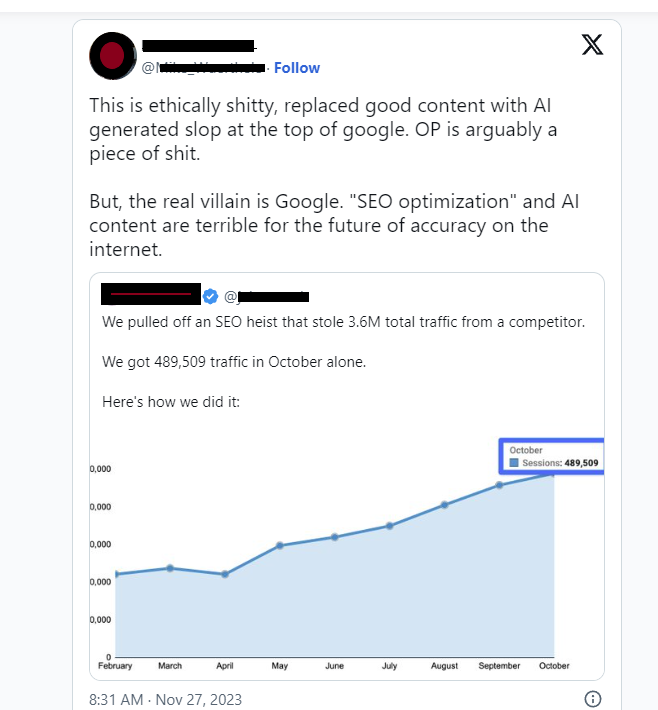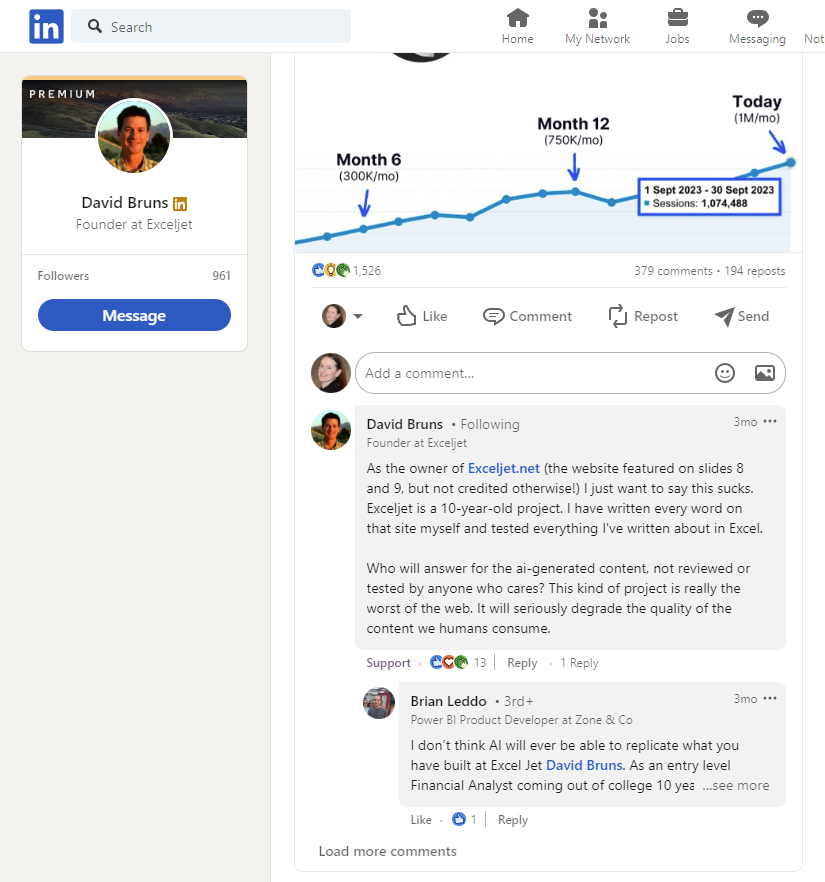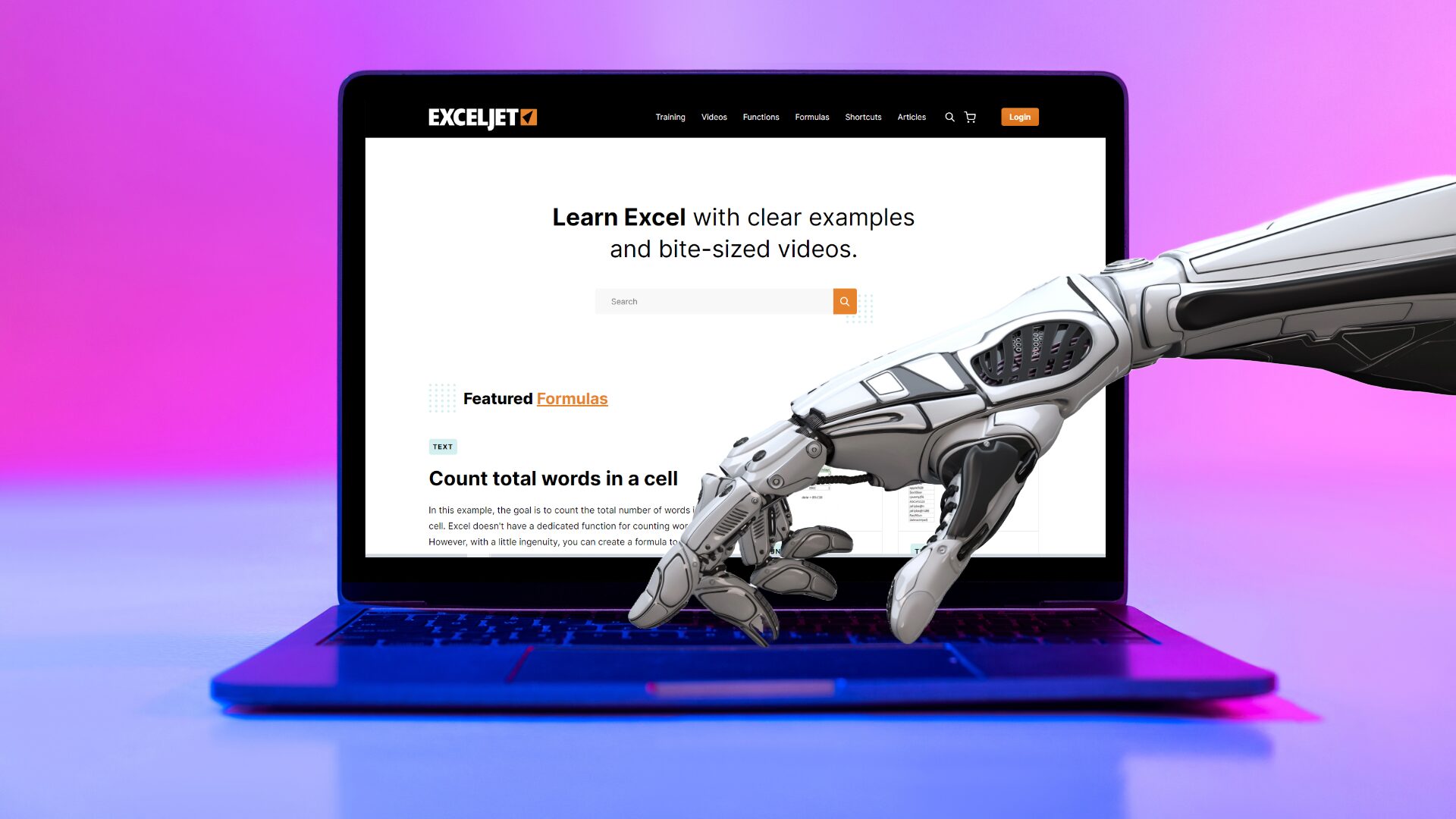Social media platforms are filled with AI content creation gurus singing the praises of tools like ChatGPT. They offer step-by-step instructions on how anyone can gain Google’s favor by following their guidance.
Technically, some of their techniques work (even if just temporarily).
One of the latest brags online is how easy it is to boost your brand’s SEO by asking AI to create thousands of articles focused on top-performing content from your competitors. It’s true you can quickly and easily create large batches of optimized content for your website with ChatGPT and other similar tools. The downside is the AI output is neither authentic nor high-quality.
Still, it’s hard to resist leaping head-first onto the AI bandwagon when you see marketing folks posting screenshots of the insane traffic they’ve generated with the technology.
Let’s explore both sides of the coin to help you decide whether AI-generated content is a friend or foe to your content marketing strategy.
The rise of AI content creation
AI-powered technologies such as natural language learning processing and machine learning algorithms paved the way for AI content creation. The release of advanced AI systems like ChatGPT-3 in 2020 made the technology accessible to everyone.
Entrepreneurs and small business owners can now choose from ChatGPT, Jasper, Claude, and Google Gemini (to name a few) to instantly produce articles, social media posts, and website copy by simply entering a few prompts.
AI is convenient, affordable, and fast, evolving from an emerging novelty to a widely accepted marketing and business solution for automating and scaling your content creation.

The pros and cons of AI content creation
Using AI for SEO gains is a controversial topic these days. On one hand, data supports the notion that AI-generated content can perform well in search rankings. On the other hand, concerns continue to grow that AI-produced copy is pushing high-quality human-created content off page 1 of the search results. A quick perusal of Google’s preferred top content validates the fear that subpar content is taking over.
Google’s ranking system is supposed to reward high-quality content. However, it doesn’t penalize content produced with the assistance of AI unless it’s used nefariously to manipulate search rankings (we’ll talk more about that later).
For now, let’s look at the pros and cons of using AI to support your SEO goals.
The pros
AI chatbots collect user behavior and preferences, plus other feedback data that can inform SEO strategies. There’s no doubt this is a valuable service with long-lasting effects on the SEO industry.
Some of the other benefits of AI tools include:
- Cost-effectiveness. Human-generated content is expensive and takes more time to produce, especially if your brand is interested in true thought leadership pieces that demonstrate industry authority. In comparison, AI content creation is affordable, making it attractive to small business owners with limited budgets.
- Optimization. Many AI tools are designed with SEO in mind. They can research relevant industry keywords and semantic search phrases in context. Creating content around that data makes it easier for search engines to rank AI content.
- Volume and speed. AI tools can produce pages of optimized content in seconds, allowing sites to quickly scale up content production. This works well for brands new to content marketing who need to use copy to generate new traffic to webpages and other digital assets.
The cons
It’s easy to get excited about all the ways you can use AI tools to boost your content marketing strategy and forget that it’s not all sunshine and roses.
One of the most significant issues with relying too heavily on ChatGPT and other AI chatbots for content creation is the potential loss of control over search rankings and referral traffic.
Human content creators provide backlinks to the source material, giving the original creators credit for their hard work. Those backlinks, in turn, boost the original author’s credibility with search engines, making their content more visible.
AI doesn’t provide attribution unless specifically requested by the user prompting it.
Other downsides to AI content creation include:
- Plagiarism. AI tools scrape and then spin existing content from its databases and the web. It sometimes duplicates text word-for-word, which violates search engine guidelines and can negatively impact your SEO.
- User experience. Google and Bing consider the user experience when rewarding content in the top search results. Generic, robotic-sounding AI content that fails to connect with readers emotionally or convey your brand personality degrades the overall user experience.

The infamous SEO heist (and how it backfired)
Remember when we said that we’d talk later about how trying to use AI to game the SEO rankings can backfire?
It’s later.
We’re about to give you a real-life example of how misusing AI to manipulate Google and other search engines can end up negatively impacting your SEO efforts when you’re caught.
Case in point: tech entrepreneur Jake Ward gleefully bragged on his social media about how he stole 3.6 million clicks in what he dubbed an epic “SEO heist.”
Here’s how he did it:
- He visited a top competitor’s website and downloaded the sitemap that included specific details about the contents of each web page on the site.
- He took the data and used AI to turn all the URLs from the competitor’s website into article titles.
- He used AI to take each of those 1,800 titles and create articles around them in a few hours, using relevant SEO keywords.
- He posted the articles on a new website.
Sounds harmless, right?
Wrong.
While he managed to generate 3.6 million in total traffic in 18 months, the gains didn’t last long. Other content marketing professionals began calling him out for his tactics, which attracted the attention of Google.
Let’s just say Google wasn’t amused with the gaming of their system. The search engine giant downgraded the site that was used to pull off the heist.
Ward is unapologetic about the methods he used to achieve these SEO gains, even though they can be easily classified as Black Hat SEO. He also argues that no one was harmed by his actions.
The business owners who run Exceljet – the website AI scraped to create that 1,800 pieces of content – disagree with Ward’s assessment. Exceljet co-owner David Bruns commented publicly on Ward’s brag post on LinkedIn about what he’d done. You can see a screenshot of his comments below.
Ward’s tactics failed to follow the EEAT (Expertise, Experience, Authority, Trustworthiness) model Google uses to determine the credibility of websites. He may have cheated the system successfully for a while, but Google and other algorithms continue to evolve, making it harder to get away with this kind of unethical behavior.

It’s about the conversions, silly
Besides getting penalized by Google, there’s another problem with Ward’s approach to using AI to boost SEO. Getting traffic to your website is just one phase of a solid content marketing strategy. Converting that traffic into paying customers is the real measure of your content’s value.
Traffic vs. conversions is another one of those heated topics among content marketing professionals. Yes, you need traffic to your site to make sales. However, once you get eyeballs on your content, is it going to engage your ideal customers and convince them to part ways with their hard-earned money?
If you’re not sure you can answer that question with a resounding yes, then you have a big problem.
More traffic doesn’t automatically mean more sales. You must target your audience and give them the kind of content that educates and entertains. Create something new instead of using AI to simply regurgitate content that can be found on all your competitors’ websites. That’s the secret sauce for targeted traffic that turns into guaranteed conversions.
Future of AI content creation for SEO
Google isn’t opposed to AI-generated content. There’s no evidence it’s penalizing copy written entirely or in part by the likes of Chat GPT, Google Gemini, or Claude.
However, the key to continuing to rank well for SEO is to make sure all of your content is produced for people first, and SEO second.
Not sure how to do that? The key is to find an AI content creation consultant who understands how to create compelling copy that engages and converts your readers while following SEO best practices.


1 thought on “AI-Generated Content: Friend or Foe in SEO”